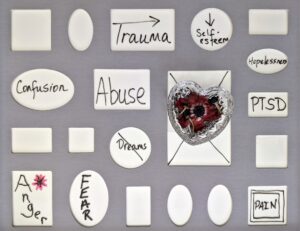In the basic definition, trauma is defined as a personal response to an event that is overwhelming physically, psychologically, emotionally, and mentally. Traumatic events happen at any age to any person, and they can be extremely stressful.
The effects can be long-lasting but there is a way to heal. The causes may be common, but the effects are just as different as the person experiencing the event. This means that each person needs different healing strategies for trauma.
Peace I leave with you; my peace I give you. I do not give to you as the world gives. Do not let your hearts be troubled and do not be afraid. – John 14:27, NIV
Some strategies can help with healthy healing from the negative effects of trauma. Through proper therapy and counseling, a person can move toward living a life that is healthy and well-balanced.
Causes of Trauma
The many causes of trauma are not concerned with the event itself. Rather, the cause is about how a person responds to the traumatic event. That is why some people are affected by trauma when others who face the same event are not.
Some of the most common causes of trauma in people are:
- Childhood neglect.
- Unstable home environment.
- Sexual abuse/assault.
- Medical trauma/severe illness.
- Violence.
- Grief.
- Domestic abuse.
- Bullying.
- Combat.
- Terrorism.
- Witnessing a harmful event.
- Natural disasters.
Individuals who experience these events firsthand may react in a way that will have a long-lasting effect on them. Without proper counseling for trauma, a person can develop other conditions that affect their overall well-being.
The Different Types of Trauma
The form of trauma is not always the same between two individuals, even though the situation is the same. The type of trauma a person faces refers to the level of mental or physical effects of the event.
 Acute trauma is defined as a short-term reaction to a one-time event that only lasts a short amount of time. There is a chance that this type of trauma can resolve itself or may be overcome through counseling. Events that can cause acute trauma are car accidents, sudden death of a loved one, or a medical emergency.
Acute trauma is defined as a short-term reaction to a one-time event that only lasts a short amount of time. There is a chance that this type of trauma can resolve itself or may be overcome through counseling. Events that can cause acute trauma are car accidents, sudden death of a loved one, or a medical emergency.
Complex trauma typically refers to those events that have no way of escape. These are events that cause feelings of being trapped. The event is often repeated on various levels. These types of events are typically those that are experienced during childhood, such as abuse.
Chronic trauma refers to the harmful effects of prolonged events. The inability to escape the events eventually gives way to serious mental health conditions. Some examples of trauma typically labeled as chronic are bullying, neglect, domestic violence, and any form of abuse.
Secondary trauma describes trauma that results from being exposed to the trauma of other people. This can lead to an emotional response called compassion fatigue; a condition in which people in certain professions avoid becoming emotionally attached to avoid being distressed. The events associated with this type of trauma are those that include injury and mayhem that physicians, first responders, and law enforcement officials face.
Adverse childhood experiences are a type of trauma that covers a multitude of events affecting children 17 and under. They typically interfere with the development of coping skills and disrupt the bond between parents (caregivers) and children. These include events such as the loss of a parent, neglect, physical/sexual abuse, and divorce.
Symptoms of Trauma
It is difficult to define the normal symptoms of trauma because of the different ways people respond. There are a few symptoms that can be expected to occur after most traumatic events.
Hypervigilance
After a traumatic event, it is normal to be cautious about the surroundings. It is a way for our body to be in protective mode so that we are alert to potential threats or harmful situations.
Intrusive thoughts
A person who has experienced a traumatic event will experience some form of intrusive thoughts that will be a reminder of the event. This will occur most commonly when there is a presence of an image, a person, or a place similar to the event.
Feeling unsafe
There is no question that after certain types of traumatic situations, a person may feel unsafe. They may find that they cannot feel safe in any situation or place because it reminds them of the event.
Hyperarousal
For some people being on edge is a response to an event that has left them feeling unsafe. Being on edge is a part of the body’s natural protection to warn of danger. This will produce a sensitivity to possible future traumatic events.
Healing Strategies for Trauma
 Understanding what has caused the trauma and what type the individual struggles with can help them formulate strategies to help them heal and enjoy a healthy way of life. Each person must realize that they will be okay and that it is normal for people to respond to trauma healing in different ways.
Understanding what has caused the trauma and what type the individual struggles with can help them formulate strategies to help them heal and enjoy a healthy way of life. Each person must realize that they will be okay and that it is normal for people to respond to trauma healing in different ways.
Healing happens a little at a time
Trauma may or may not happen suddenly. However, the healing and recovery will take time as the person works toward understanding the steps to recovery.
- Pre-trauma thought processes are the viewpoints that a person had prior to the trauma.
- Rumination is the stage where the brain works through the process of the trauma and what happened.
- Event centrality focuses on a turning point that points to the change in your life due to the trauma.
- Control is a stage that helps with taking steps to change life and cope with the trauma symptoms.
- Mastery is the point at which a person adjusts to the new life in a well-balanced way due to coping skills.
Healing includes the whole self
Trauma healing isn’t just consumed with one area of the person. It considers the whole being as the person uses helpful approaches for mind, body, and emotions.
Healing isn’t a competition
Knowing that others have faced the same trauma can be comforting. However, a person must keep in mind that each person will have a different healing journey even though the event may be the same. It is best to stay focused on personal recovery and not try to follow that of others.
Healing needs support
To heal from trauma some people need the ability to talk with others who have experienced the same type of event. This can allow for the release of stress and fear of being alone in the recovery journey.
Healing needs self-care
 Taking care of oneself can be a great benefit for trauma healing. A body needs to have rest and nutrition to help with stress reduction. Making time for self-care will promote feelings of being loved and worthy.
Taking care of oneself can be a great benefit for trauma healing. A body needs to have rest and nutrition to help with stress reduction. Making time for self-care will promote feelings of being loved and worthy.
Healing needs a break
As a person moves through the process of trauma healing it is helpful to take time to just rest. It’s okay to pause from everything and take time to rejuvenate. Healing a body takes energy and energy comes from rest.
Healing needs prayer
As healing begins it is helpful to have routine prayer time. This will reduce the level of anxiety and stress. Reading and reflecting on God’s word will produce feelings of peace and joy.
Healing has emotions
Recovering from a traumatic event will come with feelings. Rather than fight these feelings and keep them hidden, it is recommended that a person learn to lean into the feelings to help manage the stress. Feeling the feelings doesn’t mean they will last forever. Work through them in creative ways to allow them to pass.
Next Steps
 As a person heals from trauma it is important to remember that everyone is different. Learning why the person responded in a certain way is one step toward finding the right healing strategies for trauma. If you or a loved one would like more information about effective healing strategies for trauma, contact our office today.
As a person heals from trauma it is important to remember that everyone is different. Learning why the person responded in a certain way is one step toward finding the right healing strategies for trauma. If you or a loved one would like more information about effective healing strategies for trauma, contact our office today.
God promises to restore us to a place of peace that the trauma has disrupted.
I will repay you for the years the locusts have eaten – the great locust and the young locust, the other locusts and the locust swarm – my great army that I sent among you. – Joel 2:25, NIV
References:
https://www.verywellmind.com/common-symptoms-after-a-traumatic-event-2797496
https://www.verywellmind.com/common-symptoms-after-a-traumatic-event-2797496
https://www.psychologytoday.com/us/basics/trauma
https://www.healthline.com/health/mental-health/trauma-recovery#trauma-informed-care
https://www.verywellmind.com/10-ways-to-heal-from-trauma-5206940
https://psychcentral.com/health/what-is-trauma#how-to-heal
Photos:
“Trauma”, Courtesy of Susan Wilkinson, Unsplash.com, CC0 License; “Watching the Surf”, Courtesy of Engin_Akyurt, Pixabay.com, CC0 License; “Walkway”, Courtesy of Big_Heart, Pixabay.com, CC0 License; “Outstretched Hand”, Courtesy of Pixabay, Pixabay.com, CC0 License
- Kate Motaung: Curator
Kate Motaung is the Senior Writer, Editor, and Content Manager for a multi-state company. She is the author of several books including Letters to Grief, 101 Prayers for Comfort in Difficult Times, and A Place to Land: A Story of Longing and Belonging...
Recent Posts
DISCLAIMER: THIS ARTICLE DOES NOT PROVIDE MEDICAL ADVICE
Articles are intended for informational purposes only and do not constitute medical advice; the content is not intended to be a substitute for professional medical advice, diagnosis, or treatment. All opinions expressed by authors and quoted sources are their own and do not necessarily reflect the opinions of the editors, publishers or editorial boards of Stone Oak Christian Counseling. This website does not recommend or endorse any specific tests, physicians, products, procedures, opinions, or other information that may be mentioned on the Site. Reliance on any information provided by this website is solely at your own risk.






